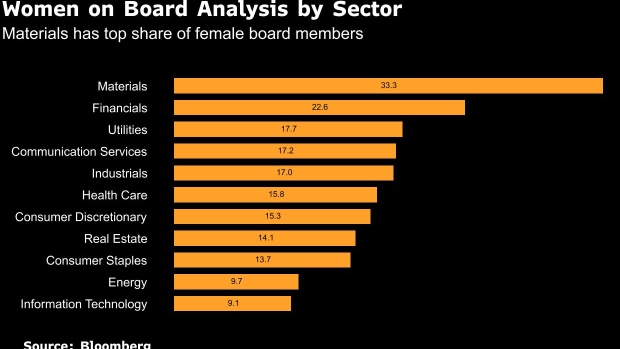Jul 26, 2022
New Hong Kong Rules Will Create 1,300 More Board Seats for Women
, Bloomberg News

(Bloomberg) -- As a woman who sits on multiple boards of Hong Kong-listed companies, Susanna Chiu is a rarity in the city.
Despite efforts to improve gender diversity on corporate boards, many local companies still rely on old-boy networks to fill directorships, said Chiu, the first woman to be president of the Hong Kong Institute of Certified Public Accountants.
Chiu, 62, is a board member of cosmetics retailer Bonjour Holdings Ltd., where she is chief financial officer, and a director at four other Hong Kong-listed companies.
“The female talent pool is here,” she said. “You just need to open your eyes.”
That’s a message that more companies will need to accept, with new Hong Kong stock exchange rules creating more than 1,300 director positions exclusively for women by the end of 2024. The move follows a global trend toward more diverse boardrooms already well under way in places like Australia, the US and Europe.
Starting this month, the exchange requires any company seeking to list in Hong Kong to have at least one director of a different gender to the board majority. In January, the exchange set a three-year deadline for every listed company, new or old, to ensure gender diversity on its board.
Women account for about 16% of board seats among companies listed in Hong Kong, according to the stock exchange.
Blue chips do slightly better, with about 17% for members of the benchmark Hang Seng Index in the second quarter of 2022, according to data compiled by Bloomberg News.
Frozen Out
The changes could open up many new opportunities for women who until now have been largely frozen out of the financial hub’s boardrooms, according to Nasrine Ghozali, chief risk officer of Oasis Management Co. and member of the steering committee of the 30% Club Hong Kong, which advocates for more gender diversity on boards.
“The new rules are creating some momentum for companies to finally consider diverse board candidates,” she said. “For many years, Hong Kong has been lagging, globally and regionally, so it’s great to see finally some progress.”
Out of more than 2,500 companies listed on the exchange, 815 had no female directors at all, according to an April 2021 consultation paper from the Hong Kong bourse.
Those companies will need to find women to serve on their boards, Ghozali said, as will the 180 or so companies that typically list each year in Hong Kong.
That translates into more than 1,300 board seats for women, she said.
Untapped Talent Pools
So far, that hasn’t generated much demand at the Hong Kong Independent Non-Executive Director Association, which keeps an active “talent pool” archive featuring gender and professional field filters, said president Roy Lo.
Companies tend to “tap the network of the major shareholder or the chairman,” said Lo. “It needs to evolve.”
Women held four more seats on the boards of companies in the Hang Seng Index in the second quarter from the previous three-month period, the biggest increase in two quarters, the data compiled by Bloomberg show. The average number of female directors was unchanged at 1.8, out of an average board size of 11.2.
- The percentage of female directorships increased to 16.5% from 15.7%
- That’s above the 14% of women on boards of Nikkei 225 companies in Japan, and below the 35% of women on boards of S&P/ASX 200 members in Australia, 32% of the S&P 500 in the U.S. and 39% of the Stoxx 600 in Europe
- Five Hang Seng Index companies increased the number of women on their boards; the top companies by market capitalization were China Mobile Ltd., Xinyi Solar Holdings Ltd. and CSPC Pharmaceutical Group Ltd.
- China Mobile, Xinyi Solar and CSPC Pharma no longer have all-male boards
- HSBC Holdings Plc was the only company to reduce the number of female directors
- Hang Seng Bank Ltd. has the highest percentage of women on its board
- The information technology sector led the net gain in female board members, with one woman added to the boards at Xinyi Solar and Lenovo Group Ltd.
- Financials notched a net decline of one female director, with HSBC Holdings losing a female board member
- There are eight HSI companies above the key threshold of 30% female board membership
- Seven companies, including Meituan, BYD Co. and Xiaomi Corp., do not have any female board members
- The Bloomberg Gender-Equality Index dropped 15% in the second quarter, outperforming the MSCI World Index, which fell 16%
HSI companies with the highest and lowest percentage of female board members:
To see the percentage of women on a company’s board: FA ESGG
To see more on the Bloomberg Gender-Equality Index: GEI
To see more on Bloomberg’s ESG fields and sustainable finance solutions: BESG
©2022 Bloomberg L.P.





